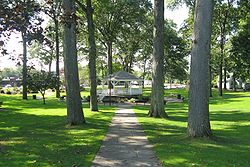Ludlow, Massachusetts
| Ludlow, Massachusetts | ||
|---|---|---|
| Town | ||

Ludlow Town Green
|
||
|
||
| Nickname(s): Soccer City, The Bubble, Mini Portugal | ||
 Location in Hampden County in Massachusetts |
||
| Coordinates: 42°9′36″N 72°28′35″W / 42.16000°N 72.47639°WCoordinates: 42°9′36″N 72°28′35″W / 42.16000°N 72.47639°W | ||
| Country | United States | |
| State | Massachusetts | |
| County | Hampden | |
| Settled | 1751 | |
| Incorporated | March 29, 1774 | |
| Government | ||
| • Type | Representative town meeting | |
| Area | ||
| • Total | 28.2 sq mi (73.1 km2) | |
| • Land | 27.2 sq mi (70.3 km2) | |
| • Water | 1.1 sq mi (2.8 km2) | |
| Elevation | 550 ft (168 m) | |
| Population (2010) | ||
| • Total | 21,103 | |
| • Density | 748.3/sq mi (288.7/km2) | |
| Time zone | Eastern (UTC-5) | |
| • Summer (DST) | Eastern (UTC-4) | |
| ZIP code | 01056 | |
| Area code(s) | 413 | |
| FIPS code | 25-37175 | |
| GNIS feature ID | 0618187 | |
| Website | http://www.ludlow.ma.us/ | |
Ludlow is a town in Hampden County, Massachusetts, United States. The population was 21,103 as of the 2010 census, and it is considered part of the Springfield Metropolitan Statistical Area. Located just northeast of Springfield across the Chicopee River, it is one of the city's suburbs. It has a sizable and visible Portuguese community.
Although plans were drawn up for settlement as early as 1685, within the original boundaries of Springfield, Massachusetts was settled in 1751 as Stony Hill Parish. However, the town was later renamed Ludlow and incorporated as a separate entity in 1774, just before the breakout of the American Revolution. For much of its early history the town was agrarian and today many of Ludlow's street names are derived from the names of these farming families (e.g. Chapin Street, Miller Street, Alden Street, Fuller Street). Ludlow was home to many sawmills and gristmills, utilizing the power from several sources of water nearby, the Chicopee River, Broad Brook, Higher Brook, and Stony Brook. Before the Civil War, the town began to develop into a mill town. This included the manufacturing of glass bottles by the many glassware companies, including John Sikes. The District was renamed from Stony Hill to Ludlow for reasons unknown to this day. Then Governor of Massachusetts Bay Colony, Thomas Hutchinson renamed the town from the District of Stony Hill to Ludlow. The town of Ludlow was possibly named after Roger Ludlow, one of the founders of the Connecticut Colony or named after Ludlow, a town in England.
...
Wikipedia

